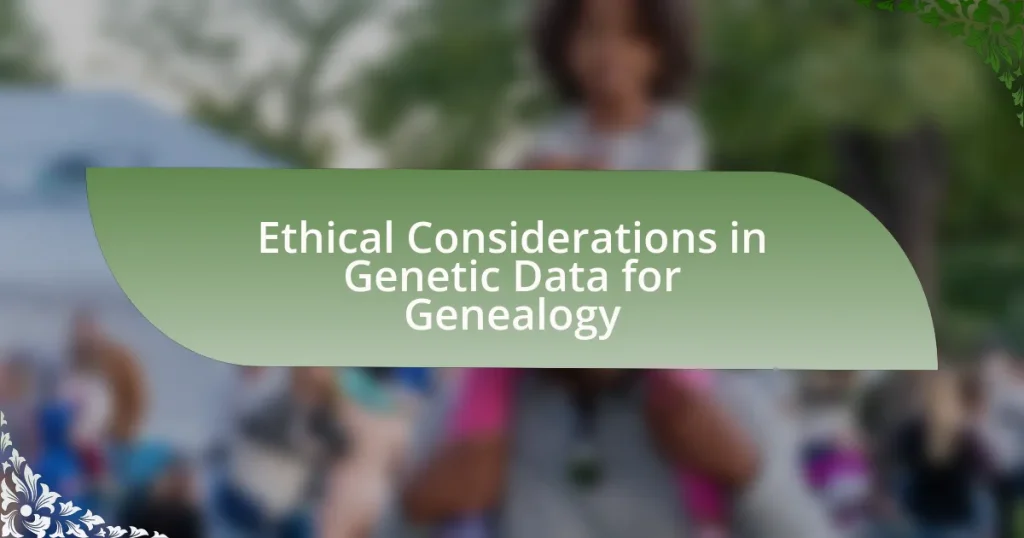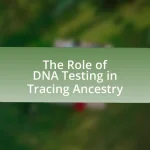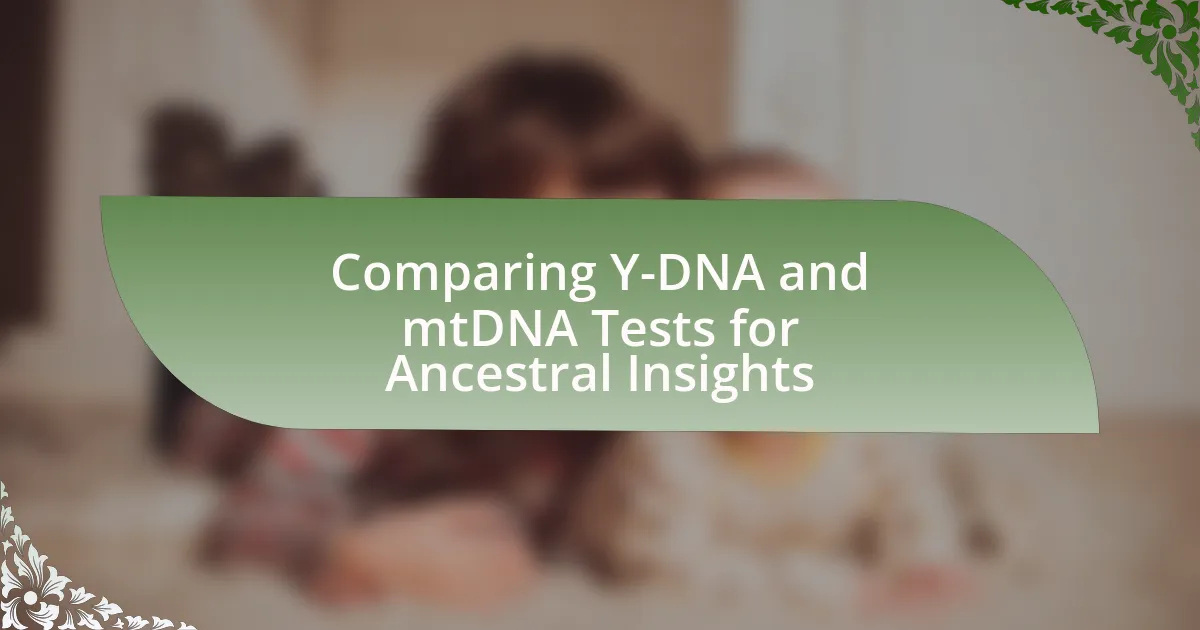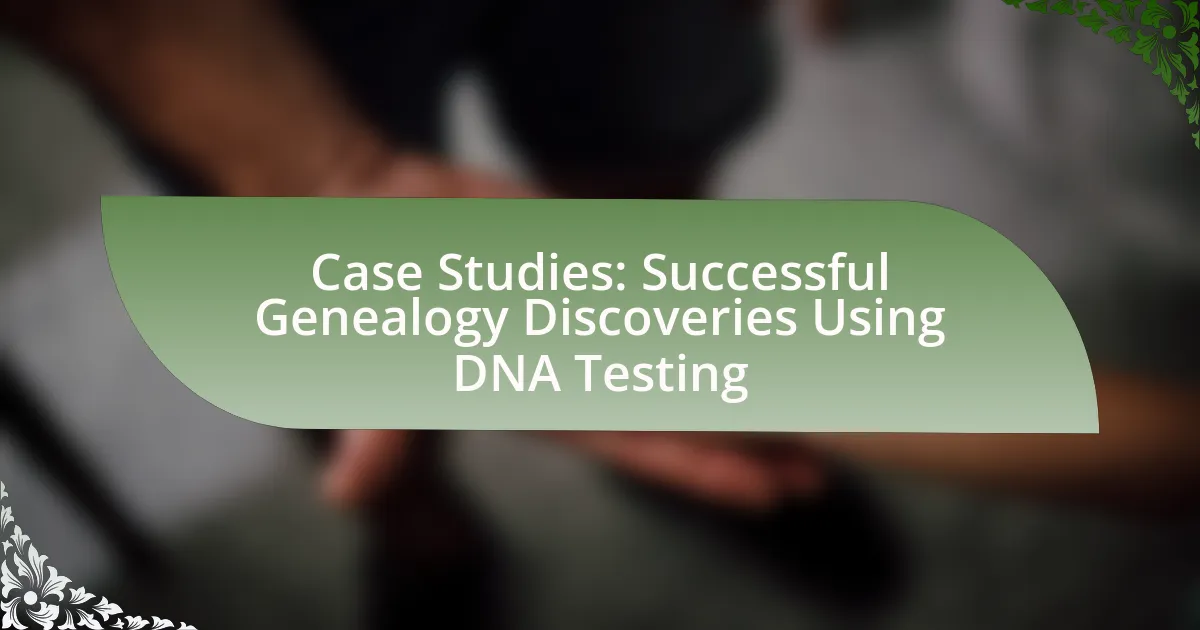The article focuses on the ethical considerations surrounding genetic data in genealogy, emphasizing key issues such as privacy, consent, and the potential misuse of genetic information. It outlines the importance of informed consent and the implications of data sharing, highlighting the risks of discrimination and privacy breaches. The article also discusses relevant regulations, including the Genetic Information Nondiscrimination Act (GINA) and the General Data Protection Regulation (GDPR), which aim to protect individuals’ rights. Additionally, it addresses the role of organizations in establishing ethical guidelines and best practices for handling genetic data responsibly.
What are the Ethical Considerations in Genetic Data for Genealogy?
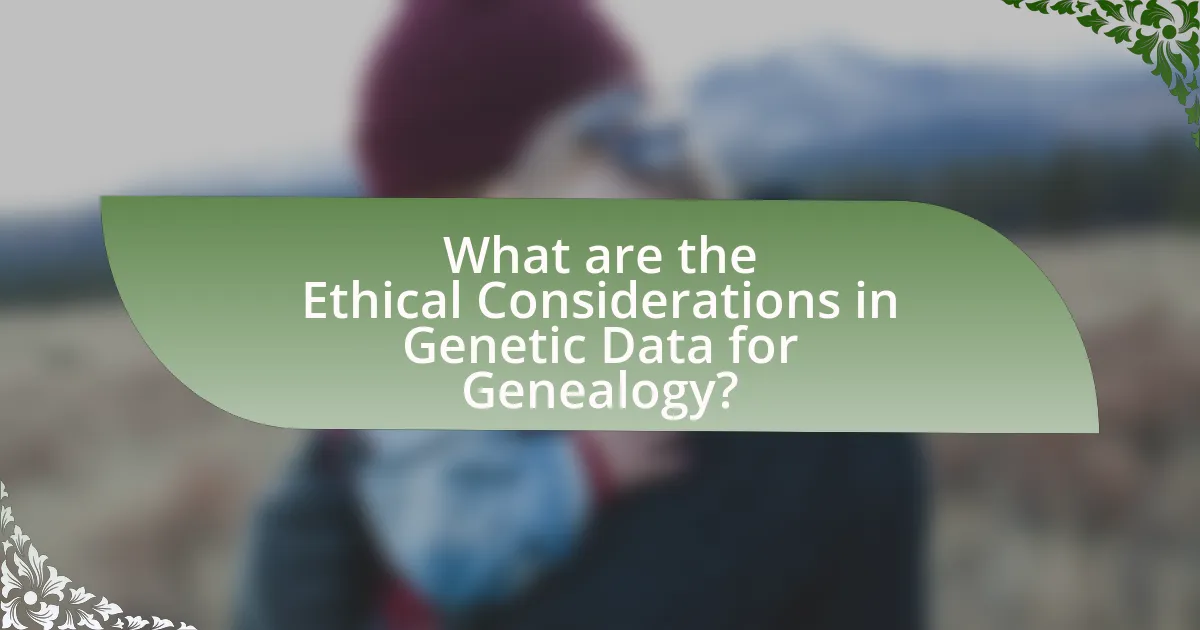
The ethical considerations in genetic data for genealogy primarily involve privacy, consent, and potential misuse of information. Privacy concerns arise from the sensitive nature of genetic data, which can reveal not only individual identities but also familial connections. Consent is crucial, as individuals must be informed about how their genetic information will be used and shared, particularly when it involves third parties or databases. Additionally, there is a risk of misuse, such as discrimination by employers or insurers based on genetic predispositions. These considerations are underscored by regulations like the Genetic Information Nondiscrimination Act (GINA) in the United States, which aims to protect individuals from discrimination based on genetic information.
Why is ethical consideration important in genetic genealogy?
Ethical consideration is important in genetic genealogy because it ensures the responsible use of genetic data, protecting individuals’ privacy and autonomy. Genetic genealogy involves analyzing DNA to trace ancestry, which can reveal sensitive information about a person’s heritage and potential health risks. Without ethical guidelines, there is a risk of misuse of this data, such as unauthorized sharing or discrimination based on genetic information. For instance, the American Society of Human Genetics emphasizes the need for informed consent and transparency in genetic testing to safeguard individuals’ rights and maintain public trust in genetic research.
What ethical dilemmas arise from the use of genetic data in genealogy?
The use of genetic data in genealogy raises several ethical dilemmas, primarily concerning privacy, consent, and potential misuse of information. Privacy issues arise when individuals’ genetic information is shared without their explicit consent, leading to unauthorized access to sensitive data. Consent becomes problematic when individuals may not fully understand the implications of sharing their genetic information, especially regarding familial connections that could reveal unexpected relationships or health risks. Additionally, the potential for misuse of genetic data by third parties, such as insurance companies or law enforcement, poses significant ethical concerns, as it could lead to discrimination or stigmatization based on genetic predispositions. These dilemmas highlight the need for robust ethical guidelines and regulations governing the use of genetic data in genealogy.
How do ethical considerations impact individuals and families?
Ethical considerations significantly impact individuals and families by influencing their decisions regarding the use of genetic data in genealogy. These considerations shape how families perceive privacy, consent, and the potential consequences of sharing genetic information. For instance, concerns about data misuse can lead individuals to hesitate in participating in genetic testing, affecting family dynamics and the sharing of ancestral information. Research indicates that 70% of individuals express worries about the privacy of their genetic data, which can deter them from engaging in genealogy activities that could otherwise strengthen familial bonds and heritage understanding.
What are the potential risks associated with genetic data in genealogy?
The potential risks associated with genetic data in genealogy include privacy breaches, discrimination, and psychological impacts. Privacy breaches can occur when genetic information is shared without consent, leading to unauthorized access to sensitive data. Discrimination may arise in employment or insurance contexts, as genetic predispositions can be misused to deny opportunities or coverage. Psychological impacts can stem from unexpected discoveries about ancestry or health risks, which may cause distress or alter family dynamics. These risks highlight the need for stringent data protection measures and ethical guidelines in the use of genetic data for genealogical purposes.
How can privacy be compromised through genetic data sharing?
Privacy can be compromised through genetic data sharing when individuals’ genetic information is accessed or used without their consent, leading to potential identification and misuse of sensitive data. Genetic data can reveal not only an individual’s traits and predispositions but also familial connections, making it possible to infer information about relatives. For instance, a study published in the journal “Nature” highlighted that even anonymized genetic data could be re-identified through cross-referencing with public databases, thereby exposing individuals to risks such as discrimination or stigmatization based on their genetic predispositions. This underscores the importance of stringent data protection measures and informed consent in genetic data sharing practices.
What are the implications of data misuse in genealogical research?
Data misuse in genealogical research can lead to significant ethical and legal implications, including breaches of privacy and the potential for discrimination. When individuals’ genetic information is improperly accessed or shared without consent, it violates their right to privacy and can result in unauthorized use of sensitive data. For instance, misuse may lead to individuals being unfairly targeted by insurance companies or employers based on genetic predispositions to certain health conditions, as highlighted in the Genetic Information Nondiscrimination Act of 2008, which aims to protect individuals from such discrimination. Additionally, data misuse can undermine public trust in genealogical research, discouraging participation in genetic studies and limiting the advancement of knowledge in the field.
How do consent and ownership play a role in genetic data ethics?
Consent and ownership are fundamental to genetic data ethics as they determine who has the right to control and use genetic information. Consent ensures that individuals voluntarily agree to share their genetic data, which is crucial for respecting personal autonomy and privacy. Ownership, on the other hand, addresses the question of who holds the rights to genetic data once it is collected, influencing how that data can be used, shared, or commercialized. For instance, the National Institutes of Health emphasizes the importance of informed consent in research involving human subjects, highlighting that individuals should be fully aware of how their genetic data will be utilized. This framework establishes a legal and ethical basis for protecting individuals’ rights and promoting responsible use of genetic information.
What constitutes informed consent in genetic genealogy?
Informed consent in genetic genealogy constitutes a clear agreement from individuals to participate in genetic testing and data sharing, ensuring they understand the implications of their participation. This includes providing comprehensive information about the nature of the genetic tests, potential risks, benefits, and how their genetic data will be used, stored, and shared. Furthermore, informed consent must be obtained voluntarily, without coercion, and individuals should have the right to withdraw their consent at any time. The necessity for informed consent is underscored by ethical guidelines from organizations such as the American Society of Human Genetics, which emphasize the importance of transparency and respect for individual autonomy in genetic research.
Who owns the genetic data once it is shared for genealogical purposes?
Once genetic data is shared for genealogical purposes, ownership typically remains with the individual who provided the data, but the rights to use that data may be transferred to the organization or platform that processes it. This is often outlined in the terms of service or consent agreements that users accept when submitting their genetic information. For instance, many genealogy companies specify that while users retain ownership of their genetic data, they grant the company a license to use that data for research and other purposes, as stated in their privacy policies.
What regulations govern the use of genetic data in genealogy?

The use of genetic data in genealogy is primarily governed by regulations such as the Genetic Information Nondiscrimination Act (GINA) in the United States, which prohibits discrimination based on genetic information in health insurance and employment. Additionally, the Health Insurance Portability and Accountability Act (HIPAA) provides privacy protections for health-related genetic data. In Europe, the General Data Protection Regulation (GDPR) establishes strict guidelines on the processing of personal data, including genetic information, ensuring individuals have control over their data and consent is obtained for its use. These regulations collectively aim to protect individuals’ privacy and prevent misuse of genetic information in genealogy.
How do laws vary across different countries regarding genetic data?
Laws regarding genetic data vary significantly across countries, reflecting differing cultural, ethical, and legal frameworks. For instance, the European Union enforces strict regulations under the General Data Protection Regulation (GDPR), which mandates explicit consent for processing genetic data and grants individuals rights over their data. In contrast, the United States has a more fragmented approach, with laws like the Genetic Information Nondiscrimination Act (GINA) protecting against discrimination but lacking comprehensive data protection regulations. Additionally, countries like Canada have established specific privacy laws that govern genetic information, emphasizing consent and data security. These variations highlight the complexities of international legal standards concerning genetic data, influenced by local values and societal norms.
What are the key regulations in the United States concerning genetic data?
The key regulations in the United States concerning genetic data include the Genetic Information Nondiscrimination Act (GINA), the Health Insurance Portability and Accountability Act (HIPAA), and the Federal Policy for the Protection of Human Subjects (Common Rule). GINA prohibits discrimination based on genetic information in health insurance and employment, ensuring individuals cannot be denied coverage or employment due to their genetic predispositions. HIPAA establishes standards for the protection of health information, including genetic data, requiring consent for its use and disclosure. The Common Rule governs the ethical conduct of research involving human subjects, mandating informed consent and the protection of participants’ privacy, which extends to genetic research. These regulations collectively aim to safeguard individuals’ rights and privacy regarding their genetic information.
How do European regulations differ from those in the United States?
European regulations, particularly the General Data Protection Regulation (GDPR), impose stricter data protection and privacy requirements compared to regulations in the United States. The GDPR mandates explicit consent for data processing, grants individuals rights over their data, and enforces heavy penalties for non-compliance, reflecting a more protective stance on personal data. In contrast, U.S. regulations are generally more fragmented and less stringent, often allowing for broader data usage without explicit consent, as seen in laws like the Health Insurance Portability and Accountability Act (HIPAA) which primarily focuses on health data rather than comprehensive personal data protection. This fundamental difference highlights Europe’s prioritization of individual privacy rights in the context of genetic data for genealogy.
What role do organizations play in regulating genetic data ethics?
Organizations play a crucial role in regulating genetic data ethics by establishing guidelines and standards that govern the collection, use, and sharing of genetic information. These organizations, such as the American Society of Human Genetics and the National Institutes of Health, create ethical frameworks that ensure informed consent, privacy protection, and equitable access to genetic data. For instance, the National Human Genome Research Institute emphasizes the importance of ethical considerations in genomic research, advocating for transparency and respect for individuals’ rights. By setting these standards, organizations help mitigate risks associated with genetic data misuse and promote responsible practices in the field of genealogy.
How do professional organizations establish ethical guidelines for genetic genealogy?
Professional organizations establish ethical guidelines for genetic genealogy through a collaborative process that involves expert input, stakeholder engagement, and adherence to legal and ethical standards. These organizations typically form committees comprising geneticists, ethicists, legal experts, and representatives from the genealogy community to draft guidelines that address privacy, consent, and data usage. For instance, the American Society of Human Genetics has published guidelines emphasizing informed consent and the responsible use of genetic data, reflecting a commitment to ethical practices in the field.
What impact do advocacy groups have on genetic data policies?
Advocacy groups significantly influence genetic data policies by promoting ethical standards and protecting individual privacy rights. These organizations often engage in lobbying efforts to shape legislation, ensuring that genetic data is handled responsibly and transparently. For instance, the American Civil Liberties Union (ACLU) has actively campaigned for laws that safeguard genetic information from misuse, highlighting the potential risks of discrimination based on genetic data. Their efforts have led to the establishment of policies that require informed consent and limit data sharing, thereby enhancing public trust in genetic research and genealogy practices.
What best practices should be followed in genetic genealogy research?
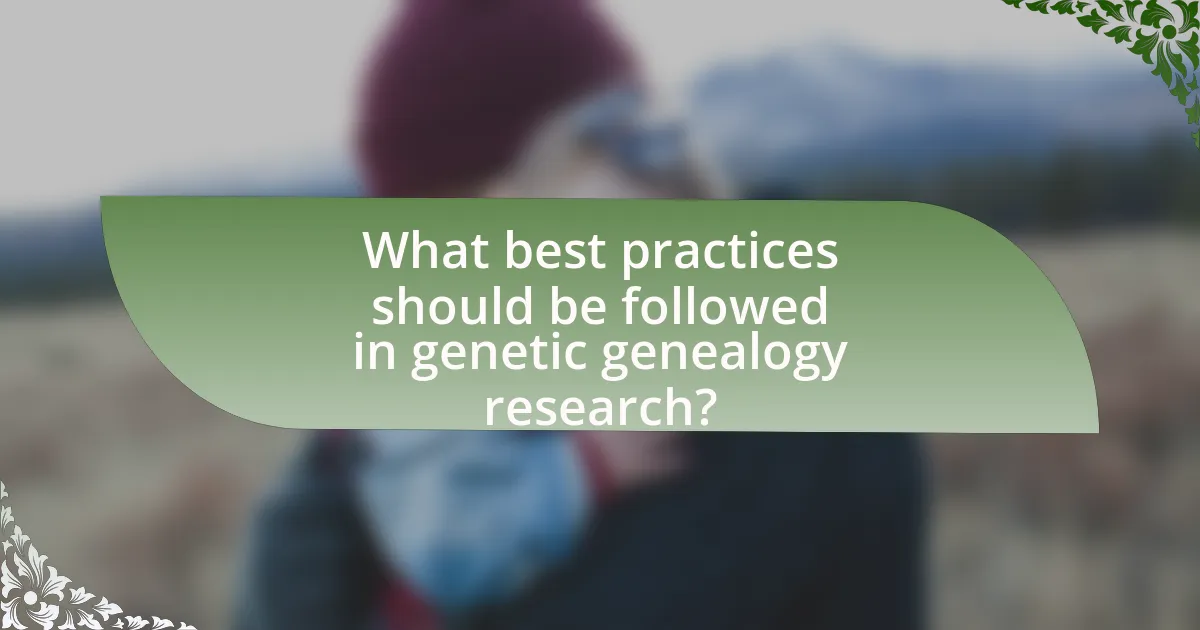
Best practices in genetic genealogy research include obtaining informed consent from participants, ensuring data privacy, and using reputable testing companies. Informed consent is crucial as it allows individuals to understand how their genetic data will be used and shared. Data privacy is essential to protect sensitive information from unauthorized access, which can be achieved by anonymizing data and implementing strong security measures. Utilizing reputable testing companies ensures that the genetic data is analyzed accurately and ethically, as these companies adhere to industry standards and regulations. Following these practices helps maintain ethical integrity in genetic genealogy research.
How can researchers ensure ethical handling of genetic data?
Researchers can ensure ethical handling of genetic data by obtaining informed consent from participants, implementing data anonymization techniques, and adhering to relevant legal and ethical guidelines. Informed consent requires that individuals understand how their genetic data will be used, stored, and shared, which is crucial for respecting their autonomy. Data anonymization protects individual identities by removing personally identifiable information, thereby minimizing privacy risks. Additionally, compliance with regulations such as the Health Insurance Portability and Accountability Act (HIPAA) in the United States and the General Data Protection Regulation (GDPR) in Europe provides a legal framework that mandates ethical practices in data handling. These measures collectively promote responsible stewardship of genetic data, safeguarding participant rights and fostering public trust in genetic research.
What steps should be taken to obtain informed consent from participants?
To obtain informed consent from participants, researchers must follow a systematic process that includes providing clear information about the study, ensuring comprehension, and obtaining voluntary agreement. First, researchers should present detailed information regarding the purpose, procedures, risks, benefits, and confidentiality measures associated with the study. This information must be communicated in a language and format that participants can easily understand.
Next, researchers should assess participants’ understanding by encouraging questions and providing clarifications as needed. This step is crucial to ensure that participants are fully aware of what their consent entails. Finally, researchers must obtain explicit consent, typically through a signed consent form, which confirms that participants agree to participate based on the information provided. This process aligns with ethical guidelines established by organizations such as the American Psychological Association, which emphasizes the importance of informed consent in research involving human subjects.
How can researchers protect the privacy of individuals involved in genetic studies?
Researchers can protect the privacy of individuals involved in genetic studies by implementing robust data anonymization techniques. Anonymization involves removing or altering personal identifiers from genetic data, ensuring that individuals cannot be easily re-identified. For instance, the use of coding systems, where identifiable information is replaced with unique codes, allows researchers to analyze genetic data without linking it back to specific individuals. Additionally, researchers can employ secure data storage solutions and limit access to sensitive information to authorized personnel only. According to the National Institutes of Health, adhering to ethical guidelines and regulations, such as the Common Rule, further reinforces the protection of participant privacy in genetic research.
What resources are available for understanding ethical considerations in genetic genealogy?
Resources available for understanding ethical considerations in genetic genealogy include academic articles, guidelines from professional organizations, and books focused on the subject. For instance, the American Society of Human Genetics provides a set of guidelines addressing ethical issues in genetic testing and genealogy. Additionally, the book “Genetic Genealogy in Practice” by Blaine Bettinger and Debbie Parker Wayne discusses ethical implications in genetic genealogy. Academic journals such as “The American Journal of Human Genetics” often publish research articles that explore ethical dilemmas related to genetic data. These resources collectively offer comprehensive insights into the ethical landscape of genetic genealogy.
Where can individuals find guidelines on ethical practices in genetic research?
Individuals can find guidelines on ethical practices in genetic research through organizations such as the National Institutes of Health (NIH) and the American Society of Human Genetics (ASHG). The NIH provides comprehensive resources on ethical considerations in research, including informed consent and data privacy, while the ASHG offers specific guidelines tailored to genetic research ethics. These organizations publish documents and position statements that outline best practices and ethical standards, ensuring researchers adhere to responsible conduct in genetic studies.
What educational programs focus on ethics in genetic genealogy?
Educational programs that focus on ethics in genetic genealogy include courses offered by institutions such as the University of Washington, which provides a course on ethical issues in genetic research, and the American Society of Human Genetics, which offers workshops and webinars addressing ethical considerations in genetic testing and genealogy. These programs emphasize the importance of informed consent, privacy, and the implications of genetic data sharing, ensuring that participants understand the ethical landscape surrounding genetic genealogy.
What are practical tips for navigating ethical dilemmas in genetic genealogy?
Practical tips for navigating ethical dilemmas in genetic genealogy include obtaining informed consent from participants before collecting genetic data, ensuring transparency about how the data will be used, and respecting privacy by anonymizing data whenever possible. Informed consent is crucial as it empowers individuals to make knowledgeable decisions regarding their genetic information. Transparency fosters trust and allows participants to understand the implications of sharing their genetic data. Anonymization protects individuals’ identities, reducing the risk of misuse of sensitive information. These practices align with ethical guidelines established by organizations such as the American Society of Human Genetics, which emphasizes the importance of ethical considerations in genetic research.
